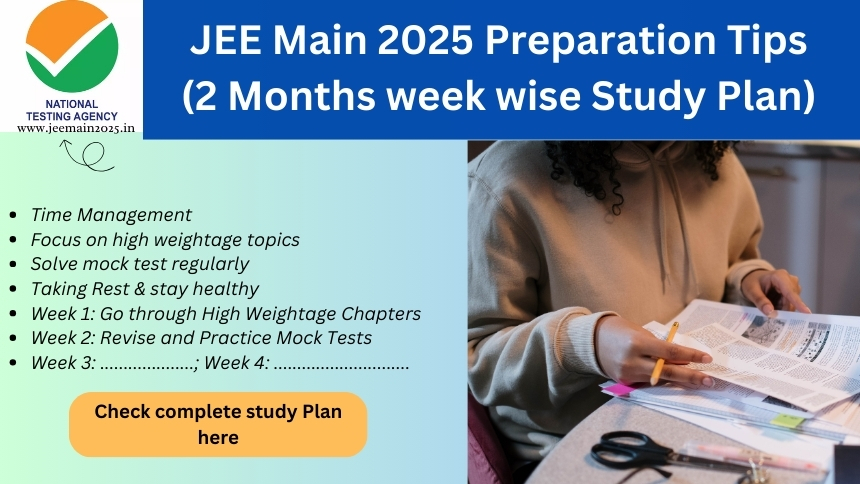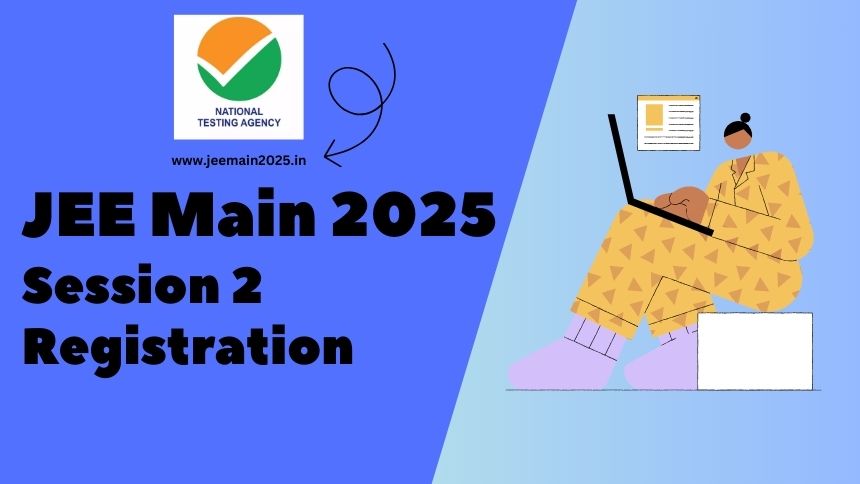JEE Main 2025 examination for the January session will be conducted from 22 January to 31 January 2025, with less than two months left for the exam, it is time for the aspirants to fine-tune their preparation.
The candidates need to make use of this time by preparing a strategic time-table, daily revision of subjects and focusing on important topics carrying a maximum weightage of marks.
In this article, we will discuss in detail about 2 months of JEE Main 2025 preparation tips and study hacks to help you crack the exam.

JEE Main 2025 Preparation Tips
Before we begin to discuss 2 months study plan for preparing JEE Main, candidates have to follow the below given tips:
Time Management
Candidates should balance their time between all three subjects i.e. Physics, Chemistry, and Mathematics. Make sure to revise all chapters and practice on a daily basis.
Focus on high weightage Topics
With a little over one and a half months left, the key here is to prioritize topics that carry significant weight in the exam. This will ensure that you have a good chance of scoring well in the exam with the limited time remaining.
Solving Mock Test is the Key
In the past many JEE Main toppers have suggested solving mock tests as a key to their exam preparation. Solving mock tests regularly helps in
simulating the exam environment and improving speed, accuracy, and time management skills.
Taking Rest and Staying Healthy
It is quite often, we see that many JEE aspirants ignore their health which at times backfires their exam preparation strategy. Candidates shouldn’t ignore their health and take proper 6-7 hours of sleep. Candidates should include short breaks and relax their mind to maintain productivity.
JEE Main 2025 – 2 Months Study Plan
Month 1: Strengthening Concepts and Practicing Problems
In the first month, candidates should focus on problem-solving ability and revising important chapters from the subjects Physics, Chemistry and Mathematics.
Week 1-2
Physics:
Topics to Cover: Mechanics (Laws of Motion, Work-Energy-Power, Rotational Motion), Heat & Thermodynamics.
Study Plan:
Theory: Go through the chapters thoroughly, ensuring clarity of concepts.
Practice: Solve problems from previous years and standard books like H.C. Verma’s Concepts of Physics or D.C. Pandey’s series.
Focus on:
Newton’s laws, energy conservation, and rotational dynamics.
First law of thermodynamics, specific heat capacity, and work done in heat transfer.
Chemistry:
Topics to Cover: Physical Chemistry (Mole Concept, Chemical Kinetics, Thermodynamics), Organic Chemistry (Hydrocarbons, Alcohols, and Ethers).
Plan:
Theory: Read and revise essential concepts. For physical chemistry, focus on laws, formulas, and problem-solving techniques.
Practice: Solve problems from NCERT and standard books like O.P. Tandon or M.S. Chauhan.
Focus on:
Basic organic reactions, functional groups, and isomerism.
Practice numerical problems involving mole concept, gases, and thermodynamics.
Mathematics:
Topics to Cover: Algebra (Quadratic Equations, Complex Numbers), Coordinate Geometry (Straight Lines, Circles), Trigonometry (Identities, Equations).
Plan:
Theory: Review key formulas and properties. Understand important derivations and their applications.
Practice: Solve problems from I.A. Maron (for calculus), S.L. Loney (for coordinate geometry) and previous year papers.
Focus on:
Solve questions involving distance, midpoint, and slopes in coordinate geometry.
Learn the standard trigonometric identities and practice problems on heights and distances.
Week 3-4
Physics:
Topics to Cover: Electricity and Magnetism (Electrostatics, Current Electricity, Magnetic Effects of Current), Modern Physics.
Plan:
Theory: Focus on concepts related to Coulomb’s law, electric fields, and potential difference.
Practice: Practice problems from books like D.C. Pandey’s series, and solve problems from previous JEE papers.
Focus on:
The laws governing circuits, capacitors, and magnetic fields.
Photoelectric effect, wave-particle duality, and atomic models.
Chemistry:
Topics to Cover: Inorganic Chemistry (Periodic Table, Chemical Bonding, Coordination Compounds).
Plan:
Theory: Focus on periodic trends, bonding theories (VSEPR, hybridization), and types of bonds in inorganic compounds.
Practice: Solve problems from previous years and revise key concepts.
Focus on:
Reactions and properties of important elements.
Preparation and properties of important inorganic compounds.
Mathematics:
Topics to Cover: Calculus (Differentiation, Integration), Probability.
Plan:
Theory: Study key concepts like limits, continuity, and differentiation.
Practice: Solve problems from I.A. Maron (for Calculus), and focuses on problem-solving techniques.
Focus on:
The application of derivatives in maxima and minima problems.
Basic integration and differentiation problems.
Month 2: Intensive Revision and Practice
In the second month, the focus shifts to intensive revision, solving full-length mock tests, and improving speed and accuracy.
Week 5-6:
Physics:
Topics to Cover: Optics, Waves, and Fluid Mechanics.
Plan:
Theory: Revise key formulas and conceptual understanding.
Practice: Solve more complex problems from standard books and previous years’ papers.
Focus on:
Optics problems (refraction, reflection, mirrors, lenses) and wave theory.
Fluid dynamics and Bernoulli’s theorem.
Chemistry:
Topics to Cover: Review all chapters, focus on revising Organic Chemistry mechanisms and Inorganic compounds.
Plan:
Theory: Revise organic reaction mechanisms, and focus on reaction types and trends in Inorganic Chemistry.
Practice: Solve mixed problems from all branches.
Focus on:
Memorizing important reagents and their effects in Organic Chemistry.
Important Inorganic reactions and periodic properties.
Mathematics:
Topics to Cover: Review Calculus, Algebra, and Coordinate Geometry.
Plan:
Theory: Revise all formulas and solve higher-level problems from reference books.
Practice: Work through advanced problems and focus on speed and accuracy.
Focus on:
Advanced integration and differentiation.
Complex algebraic expressions and problems involving sequences and series.
Week 7-8:
Mock Tests:
Start taking full-length mock tests every 2-3 days. Simulate real exam conditions by solving the papers within the allotted time (3 hours).
Analyze your performance: After each test, spend time reviewing your mistakes. Identify weak areas and revise them thoroughly.
JEE Main 2025 Preparation Tips FAQs
Q: How much time should I study each day for JEE Main 2025?
Ans: Study for 6-8 hours daily, focusing on quality over quantity. Increase time as you approach the exam but take regular breaks.
Q: How should I divide my time between Physics, Chemistry, and Mathematics?
Ans: Aim for a balanced 30-35% time allocation for each subject, adjusting based on your strengths and weaknesses.
Q: Is it okay to rely only on NCERT books for JEE Main preparation?
Ans: NCERT is essential, especially for Chemistry, but for Physics and Math, refer to additional books for advanced practice.
Q: How important are mock tests in JEE Main preparation?
Ans: Mock tests are crucial for time management, exam simulation, and identifying weak areas. Take 1-2 per week.
Q: How can I stay motivated and avoid stress during JEE Main preparation?
Ans: Set small goals, take regular breaks, stay positive, and maintain a healthy routine to manage stress effectively.=
Also Check:


